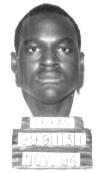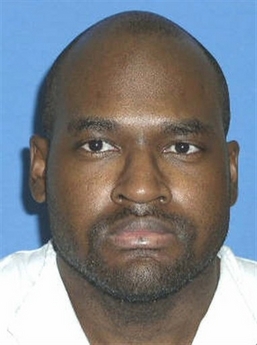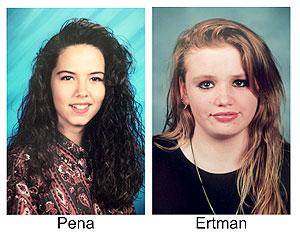Saturday, July 21, 2007
Kill the killers so no more innocents die

Jennifer Ertman and Elizabeth Pena were 14 and 16 years old, respectively. They were friends who attended the same high school in Houston, Texas, Waltrip High School.
On June 24, 1993, the girls spent the day together and then died together. They were last seen by friends about 11:15 at night, when they left a friend's apartment to head home, to beat summer curfew at 11:30. They knew they would be late if they took the normal path home, down W. 34th Street to T.C. Jester, both busy streets. They also knew they would have to pass a sexually-oriented business on that route and so decided to take a well-known shortcut down a railroad track and through a city park to Elizabeth's neighborhood.
The next morning, the girls parents began to frantically look for them, paging them on their pagers, calling their friends to see if they knew where they were, to no avail. The families filed missing persons reports with the Houston Police Department and continued to look for the girls on their own.
The Ertmans and Penas gathered friends and neighbors to help them pass out a huge stack of fliers with the girls' pictures all over the Houston area, even giving them to newspaper vendors on the roadside. Four days after the girls disappeared, a person identifying himself as 'Gonzalez' called the Crimestoppers Tips number. He told the call taker that the missing girls' bodies could be found near T.C. Jester Park at White Oak bayou. The police were sent to the scene and searched the park without finding anything.
The police helicopter was flying over the park and this apparently prompted Mr. 'Gonzalez' to make a 911 call, directing the search to move to the other side of the bayou. When the police followed this suggestion, they found the badly decaying bodies of Jenny and Elizabeth. Jennifer Ertman's dad, Randy Ertman, was about to give an interview regarding the missing girls to a local television reporter when the call came over a cameraman's police scanner that two bodies had been found. Randy commandeered the news van and went to the scene that was now bustling with police activity. Randy Ertman appeared on the local news that evening, screaming at the police officers who were struggling to hold him back,
"Does she have blond hair?Does she have blond hair?!!?"Fortunately, they did manage to keep Randy from entering the woods and seeing his daughter's brutalized body and that of her friend Elizabeth. The bodies were very badly decomposed, even for four days in Houston's brutal summer heat and humidity, particularly in the head, neck and genital areas. The medical examiner later testified that this is how she could be sure as to the horrible brutality of the rapes, beatings and murders.
The break in solving the case came from, of course, the 911 call. It was traced to the home of the brother of one of the men later sentenced to death for these murders. When the police questioned 'Gonzalez', he said that he had made the original call at his 16 year-old wife's urging. She felt sorry for the families and wanted them to be able to put their daughters' bodies to rest. 'Gonzalez' said that his brother was one of the six people involved in killing the girls, and gave police the names of all but one, the new recruit, whom he did not know. His knowledge of the crimes came from the killers themselves, most of whom came to his home after the murders, bragging and swapping the jewelry they had stolen from the girls.
While Jenny and Elizabeth were living the last few hours of their lives, Peter Cantu, Efrain Perez, Derrick Sean O'Brien, Joe Medellin and Joe's 14 year old brother were initiating a new member, Raul Villareal, into their gang, known as the Black and Whites. Raul was an acquaintance of Efrain and was not known to the other gang members. They had spent the evening drinking beer and then "jumping in" Raul. This means that the new member was required to fight every member of the gang until he passed out and then he would be accepted as a member.
Testimony showed that Raul lasted through three of the members before briefly losing consciousness. The gang continued drinking and 'shooting the breeze' for some time and then decided to leave. Two brothers who had been with them but testified that they were not in the gang left first and passed Jenny and Elizabeth, who were unknowingly walking towards their deaths. When Peter Cantu saw Jenny and Elizabeth, he thought it was a man and a woman and told the other gang members that he wanted to jump him and beat him up. He was frustrated that he had been the one who was unable to fight Raul.
The gang members ran and grabbed Elizabeth and pulled her down the incline, off of the tracks. Testimony showed that Jenny had gotten free and could have run away but returned to Elizabeth when she cried out for Jenny to help her. For the next hour or so, these beautiful, innocent young girls were subjected to the most brutal gang rapes that most of the investigating officers had ever encountered. The confessions of the gang members that were used at trial indicated that there was never less than 2 men on each of the girls at any one time and that the girls were repeatedly raped orally, anally and vaginally for the entire hour.
One of the gang members later said during the brag session that by the time he got to one of the girls, "she was loose and sloppy." One of the boys boasted of having 'virgin blood' on him. The 14-year-old juvenile later testified that he had gone back and forth between his brother and Peter Cantu since they were the only ones there that he really knew and kept urging them to leave. He said he was told repeatedly by Peter Cantu to "get some". He raped Jennifer and was later sentenced to 40 years for aggravated sexual assault, which was the maximum sentence for a juvenile.
When the rapes finally ended, the horror was not over. The gang members took Jenny and Elizabeth from the clearing into a wooded area, leaving the juvenile behind, saying he was "too little to watch".
Jenny was strangled with the belt of Sean O'Brien, with two murderers pulling, one on each side, until the belt broke. Part of the belt was left at the murder scene, the rest was found in O'Brien's home. After the belt broke, the killers used her own shoelaces to finish their job. Medellin later complained that "the bitch wouldn't die" and that it would have been "easier with a gun".
Elizabeth was also strangled with her shoelaces, after crying and begging the gang members not to kill them; bargaining, offering to give them her phone number so they could get together again. The medical examiner testified that Elizabeth's two front teeth were knocked out of her brutalized mouth before she died and that two of Jennifer's ribs were broken after she had died. Testimony showed that the girls' bodies were kicked and their necks were stomped on after the strangulations in order to "make sure that they were really dead."
The juvenile, Venancio Medellin, pled guilty to his charge and his sentence was reviewed when he turned 18, at which time he was sent to serve the remainder of the sentence in prison. The five killers were tried for capital murder in Harris County, Texas, convicted and sentenced to death. See US 5th Circuit Court summary of this case.
Derrick O'Brien was executed on July 11, 2006 for the murders of Jennifer Ertman, 14
Elizabeth Pena, 16 and Patrica Lourdes Lopez.
Sean Derrick O'Brien
Executed July 11, 2006 06:19 p.m. CST by Lethal Injection in Texas



26th murderer executed in U.S. in 2006
1030th murderer executed in U.S. since 1976
14th murderer executed in Texas in 2006
369th murderer executed in Texas since 1976
Derrick O'Brien was a ninth-grade dropout, who had previous arrests for shoplifting a pistol, assault and auto theft, and was also a suspect in a murder six months before the girls were killed but never was charged. Evidence put him at a Houston park where the body of Patricia Lopez, 27, was found. A beer can carrying his fingerprints was found under the remains of the woman. She had been raped, eviscerated and had her throat cut.
Two of the gang members, Efrain Perez and Raul Villarreal, had their death sentences commuted to life in prison when the Supreme Court last year barred executions for those who were 17 at the time of their crimes.
Peter Cantu, described by authorities as ringleader of the gang, remains on death row without an execution date.
Jose Medellin, who was condemned and who O'Brien said was at one end of the belt being pulled around Ertman's neck as he yanked on the other, had his case returned to the state courts under an order from President Bush. Medellin is among some 50 Mexican-born offenders who argue that under international law they should have been allowed assistance from the Mexican Consulate before trial.
A sixth person convicted, Medellin's brother, Vernancio, was 14 at the time and received a 40-year prison term.
NO MERCY FOR THE MERCILESSJose Medellin execution fails to ignite outrage in Mexico
11:44 AM Wed, Aug 06, 2008 | Permalink | Yahoo! BuzzTexas' most recently executed Death Row inmate, Jose Medellin, became a focal point for a lot of issues: illegal immigration (he was brought to the US by his parents as a child); US-Mexico relations (the Mexican government has long condemned capital punishment in general and US execution of its nationals in particular); the prerogatives of states vs. federal imperatives (US officials, including President George Bush, had asked Texas to delay the execution because of concerns that failure to give Medellin access to consular advice at the time of his arrest may have violated a 45-year-old treaty), and, of course, for the death penalty itself.
Yet there are suggestions that this execution didn't turn into the political hand grenade that had been anticipated. This AP story found a singular lack of outrage from the average man-on-the-street in Mexico City.
Why? Because the death penalty is an emotional issue - but so is crime.
Mexicans, the AP report says, are reeling over an escalating spiral of grotesque crimes of their own; at least two recent child murders there have received extensive publicity.
And while lawyers may split hairs over whether Texas technically violated international agreement by failing to dial up the Mexican consulate all those years ago, it's hard to muster any sympathy at all for Mr. Medellin, whose crime has been reduced in many news accounts to a single boilerplate sentence. This account includes more of the horrifying details of the torture, repeated gang rape, and strangulation of two teenage girls for which he was convicted.
So, yes, this case was about politics. But no amount of after-the-fact political interpretation can separate the emotional impact of the crime itself.
***(The following article is from
http://www.dallasnews.com/sharedcontent/dws/dn/opinion/letters/stories/DN-3p_death_0803edi.ART.State.Edition1.4d4441a.html)***
Medellín and the death penalty
12:00 AM CDT on Sunday, August 3, 2008
Re: "The World Is Watching – Gov. Perry should halt the Medellín execution," Tuesday Editorials.
Most of us are aware we are steadily losing individual rights. But what about states' rights? This past week, it appears the state of Texas may exercise its right to carry out sentencing of José Medellín, a convicted rapist and murderer.
The International Court of Justice, backed by the Bush administration, requested Texas courts reconsider the case because Mr. Medellín was denied an opportunity to contact his Mexican consulate.
The Supreme Court reviewed the matter and correctly ruled that President Bush overstepped his authority in ordering Texas to reconsider the case.
But President Bush has not given up and now dispatched his top henchmen to appeal on behalf of the international court.
While there may be some cases where the Vienna Convention might apply in federal crimes, this was a Texas case where two young girls were raped and murdered.
Rest assured, if Texas (and other states) were bound by the Vienna Convention, the Supreme Court would have said so.
Robert Eoff, Princeton
The Dallas Morning News thinks that Gov. Rick Perry should usurp the court's decision to execute illegal alien José Medellín (confessed rapist and killer of two Texas teenagers). The basis of this disapproval is a technical issue regarding a denied consular visit. We are not talking about denying legal assistance here, so there was no miscarriage of justice.
Aside from the specter of the usual contempt for the victims and their families relative to the rights of felons, this particular editorial appeal illustrates an even more ominous thinking process. It seems that we are told we should be worried about what other countries may think or do and how they may retaliate.
Frank Timmins, Dallas
I am sure the international court will be pleased to receive the concession you seek from Gov. Rick Perry. But what will we say to the families of the two girls who were so brutally killed? They have been waiting for justice since 1993. Is it in "the interests of this country and its citizens" to turn our back on the victims?
Raymond J. Trapp, Dallas
I was so sad after I read the editorial. If these were your two daughters, would you feel the same way?
I have met José Medellín. I wrote him. I have run a death row ministry in Texas for years.
He has never shown any remorse. He has proudly confessed. I used to be opposed to the death penalty until I met José.
Where is your respect and sympathy for the victims and their families? You have not even mentioned the two girls this sick creep murdered, or their families.
José Medellín found it convenient to be a Mexican citizen when he found out it could save him. What a disgrace to all the good, honest, law-abiding Mexicans.
Execute him already. The girls, along with their families, deserve justice.
Michael Denson, founder, Catholic Death Row Ministry, Frisco
***(This post contains a post from deatpenaltyyes.blogspot.com as well as a couple articles from www.dallasnews.com).*** Please feel free to leave your comments here or at the original websites,thankyou.
No comments:
Post a Comment